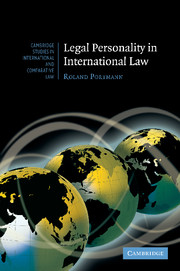Book contents
- Frontmatter
- Contents
- Foreword
- Acknowledgments
- Table of Cases
- List of Abbreviations
- Introduction
- Part I The concept of personality in international law
- Part II The conceptions of personality in international law: their origins and legal manifestations
- Part III A framework for personality in international law
- Bibliography
- Index
- Titles in the series
Part II - The conceptions of personality in international law: their origins and legal manifestations
Published online by Cambridge University Press: 05 October 2010
- Frontmatter
- Contents
- Foreword
- Acknowledgments
- Table of Cases
- List of Abbreviations
- Introduction
- Part I The concept of personality in international law
- Part II The conceptions of personality in international law: their origins and legal manifestations
- Part III A framework for personality in international law
- Bibliography
- Index
- Titles in the series
Summary
In this second Part, the five conceptions of international personality present in international legal argument today – ‘states-only’, ‘recognition’, ‘individualistic’, ‘formal’ and ‘actor’ – are examined with respect to their origins as well as to their manifestations in legal practice. It is argued that these immediately relevant conceptions have formed since the late nineteenth century. Earlier doctrine and practice on matters of international personality are thus not considered to directly inform current international law discourse. Such earlier developments can, however, enlighten the understanding of the five relevant conceptions by outlining the wider historical background of the personal scope of international law. Therefore, before exploring the conceptions still present in legal argument today, an introductory chapter will sketch the broader historical context. Thereafter, as the main object of Part II, the five conceptions of international personality present in today's international law will be examined in terms of doctrinal as well as practical developments.
- Type
- Chapter
- Information
- Legal Personality in International Law , pp. 29 - 30Publisher: Cambridge University PressPrint publication year: 2010
- 1
- Cited by



